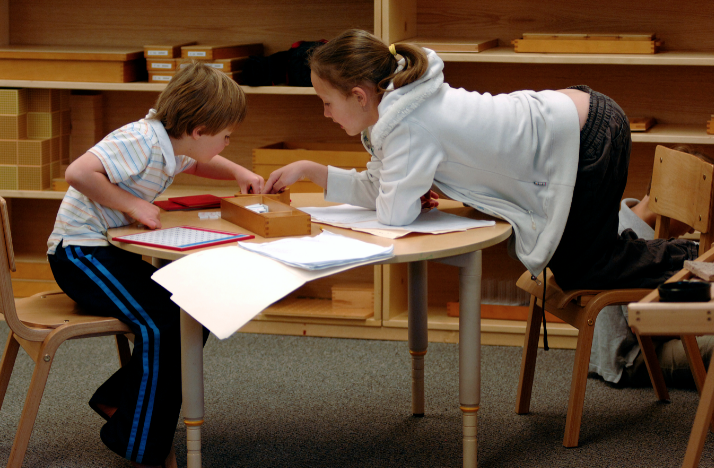Challenged with “Meaningful Work” expectations? Here’s some help…and stress relief!
“I give very few lessons on how to give lessons, lest my suggestions—becoming stereotypes & parodied—should turn into obstacle instead of help. The directress is dealing with different personalities and it therefore becomes a question of how she should orient herself in what is for her a new world, rather than any rigid and absolute rules.”
Dr. Maria Montessori quoted in Maria Montessori Her Life and Work ; E.M. Standing

Do these two words come up in your Montessori conversations? In my Montessori upbring, (ie: when I was in training and the early years), meaningful work was the goal. As I saw it, my role was to provide “meaningful work” to all my students. I accepted the challenge without question.
The lack of question was - IS - a problem.
‘Without question” leads to all sorts of problems. Which, honestly, has huge implications for nearly every challenge we face in our lives as teachers.
“Without question” holds us to other people’s standards…even Maria’s standards. ‘Without question” may lead us to focus on trivia or habit or ritual, without the purposeful thought that could lead to a meaningful experience.
“Without question” can be at the heart of stress, overwhelm and exhaustion. Here’s why:
“Without question” could mean “without discernment”: without careful consideration of the purpose, the true goal, or even the impact of the “meaningful work” on that goal.
None of those sound like what I want for me OR my students. So let’s start questioning.
The obvious: What is meaningful work?
I suppose that depends on who you’re asking. When an infant struggles - works - to get fist to mouth, that’s pretty meaningful. It means self-soothing or self-satisfying. For the exhausted parent that self-soothing means fewer minutes bouncing, holding, or, and this is a big one, trying to figure out what will make baby feel better. For baby, it’s a first step toward independence: I can take care of myself! (Now don’t get me wrong…I’m not a proponent of leaving a baby to fend for themself for hours or even minutes on end, but I am in favor of helping children take care of themselves within the context of a nurturing and caring environment.)
If one follows this train of thinking, the answer is whatever fulfills some immediate need: physical, emotional, or spiritual, as perceived by the individual.
You may be thinking, well that’s all well and good, but individuals don’t always realize what they need. After all, when we’re small, we don’t know we need to be able to read, write and do math to function in the world, so as adults who understand these things, we need to provide “meaningful work” that leads to competence in skills.
That thinking has some merit, for sure, but as guides for children, whether young or older, how often do we stop to consider if the methods we’re using to get to those skills is meaningful to the children who are practicing? Do we question those methods and consider their effectiveness? Do we consider making changes or adjustments in an effort to create greater meaning for the ones who are doing the work? If you’re thinking, “Not really” or “I never thought of it that way”, believe me you’re not alone. We went to training to learn how. For many of us, that means doing our level best to follow the directions. But read that quote again. I’m sure I’m not the only Montessorian who has ‘stereotyped and parodied’ Maria.
Here’s where that question (What’s meaningful work?) will impact you: identifying the Montessori guide’s “meaningful work.” Do you have a crystal clear definition of “meaningful work” for yourself? Are you following someone else’s definition? If so, whose is it? What are their motivations and expectations? How are you attempting to meet those expectations? Continually the recovering people-pleaser, I know that I did my best, especially in the early years, to mimic, model after, impress, and strive to make my trainers and mentors smile. When you first start out, that’s not a bad way to begin, but if you’re a people-pleaser like me, you might find yourself doing things without question.
I have two suggestions to help you begin to step out of the “meaningful work” trap. As you wrap up this part of your school year and are looking forward to some much deserved rest before you begin planning for post-vacation class, take a few minutes to reflect on these two concepts.
First: Follow the child. This means, ask the children what they want to do, to learn, how they think they will learn it, what they think will help the learning stick in their memory…and then do what you can to support them to follow their own plan for themselves. Help them assess themselves and their progress. Help them be diligent and honest, to revise their plans and begin again. You’ll not only be helping them to make meaning from the activity of their days, but you’ll also be teaching the lifelong skill of setting, addressing, and assessing progress toward their own meaningful work!
Secondly, Limit yourself to meaningful work for YOU! Take time to really drill down to the basics of what you need to do to support the children in their meaningful work. Maybe its a lesson, but it also might be making sure you have empty spaces in your day for observation, conversation, and simply getting to know your students so you can be an aid to their lives.
As you reflect on these two suggestions, I’m certain you will come up with many ideas of things to do, skills to achieve, and work that will help move your students in that direction. But be mindful of the tendency to over-work yourself in the process of providing “meaningful work” for your students. It’s just possible that you are becoming that obstacle to the most important “meaningful work” that the children are creating in their own minds!